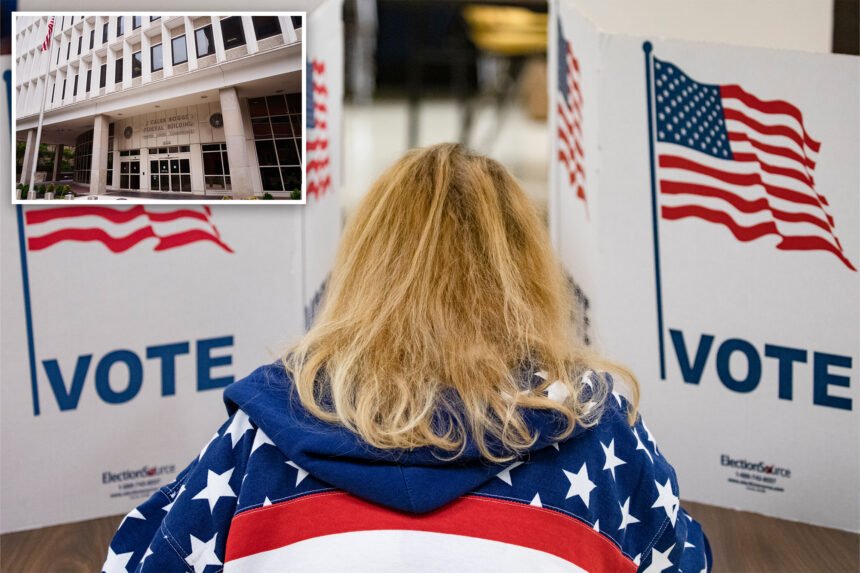Justice Department Sues Oregon and Maine Over Voter Registration Data
In a significant move that underscores ongoing tensions between state and federal authorities regarding election integrity, the U.S. Department of Justice (DOJ) has filed lawsuits against Oregon and Maine. This action marks the first legal steps taken by the DOJ in its broader initiative to obtain detailed voter registration data from various states.
Allegations of Non-Compliance
The DOJ claims that both Oregon and Maine are in violation of federal law by failing to provide electronic copies of their voter registration lists. Additionally, the department asserts that these states have not supplied information regarding ineligible voters, which is crucial for maintaining the integrity of the electoral process. The lawsuit against Oregon specifically highlights the state’s lack of transparency in how it maintains its voter list.
According to the DOJ, these actions are part of a larger effort to ensure that all American citizens have equal access to the ballot in federal elections. Assistant Attorney General Harmeet K. Dhillon emphasized the importance of compliance with federal voting laws, stating, “States simply cannot pick and choose which federal laws they will comply with.”
Context of the Lawsuits
The lawsuits against Oregon and Maine are not isolated incidents. They are part of a broader campaign by the DOJ, which has requested voter registration data from at least 26 states in recent months. This initiative has raised eyebrows among state officials, many of whom argue that the DOJ’s requests infringe upon state sovereignty and violate privacy laws.
Spokespeople for the secretaries of state in both Oregon and Maine indicated that they had not yet received formal notice of the lawsuits. This lack of communication raises questions about the DOJ’s approach and the transparency of its actions.
State Responses and Concerns
In response to the DOJ’s demands, some states have either declined to provide the requested data or have sent redacted versions of their voter lists. These redacted lists are often available to the public but do not contain personally identifiable information, such as voter names, birth dates, and addresses. The DOJ, however, has explicitly requested unredacted copies that include sensitive information, raising concerns about the potential misuse of this data.
Maine Secretary of State Shenna Bellows has been particularly vocal in her opposition to the DOJ’s demands. She described the situation as “absurd,” arguing that Maine has some of the best election practices in the nation. Bellows contends that the DOJ’s actions represent an overreach of federal power, a sentiment echoed by Oregon Secretary of State Tobias Read. He expressed his commitment to protecting the rights and privacy of Oregonians, stating, “If the President wants to use the DOJ to go after his political opponents and undermine our elections, I look forward to seeing them in court.”
The Broader Implications
The DOJ’s lawsuits come at a time when the integrity of elections is a hotly debated topic in the United States. Following the contentious 2020 presidential election, many states have enacted laws aimed at tightening voter registration and identification requirements. Critics argue that these laws disproportionately affect marginalized communities, while proponents claim they are necessary to prevent voter fraud.
The DOJ’s push for voter data is seen by some as an attempt to ensure compliance with federal election laws. However, many election officials are concerned that the agency lacks the constitutional authority to oversee elections, a power that is traditionally reserved for states and Congress. Federal law also protects individual voter data from being shared with the federal government, adding another layer of complexity to the situation.
Recent Developments
In addition to the lawsuits against Oregon and Maine, the DOJ has also threatened legal action against Minnesota and California for similar reasons. The department’s aggressive stance has prompted some states to question the motivations behind these requests, particularly in light of the political climate surrounding election integrity.
In a separate but related inquiry, the DOJ requested access to voting machines used in the 2020 election in Missouri. This request came shortly after former President Donald Trump called for a special prosecutor to investigate the election results, further fueling speculation about the DOJ’s intentions.
Conclusion
The lawsuits against Oregon and Maine represent a pivotal moment in the ongoing struggle between state and federal authorities over election integrity and voter data. As the DOJ continues its efforts to obtain detailed voter registration information, the implications for state sovereignty and individual privacy remain significant. The outcome of these legal battles could set important precedents for how elections are conducted and regulated in the United States, making it a critical issue for both policymakers and citizens alike.












This could have significant implications for voter privacy and state autonomy-where do we draw the line?